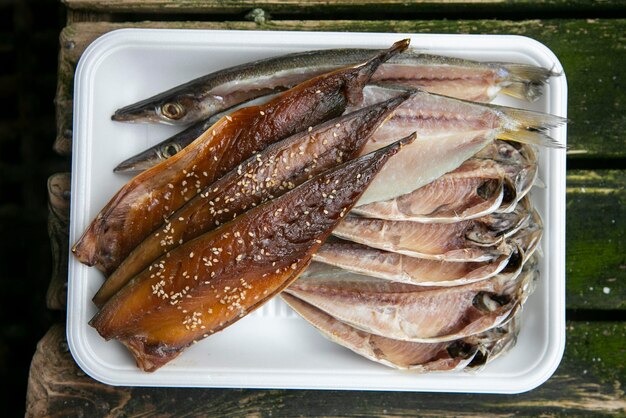Maximizing the Freshness of Cooked Fish: Your Guide to Safe Refrigeration
It's a common scenario: you’ve cooked a delicious fish dinner, but there are leftovers. The next question that often arises is, how long can you keep cooked fish in the refrigerator before it spoils? Knowing the answer can help prevent food waste and, more importantly, ensure food safety. This guide explores various facets of storing cooked fish to help you make informed decisions and keep your meals fresh and safe.
Understanding the Shelf Life of Cooked Fish
Cooked fish generally stays fresh in the refrigerator for 3-4 days. This timeframe helps maintain the quality and taste of the fish while minimizing the potential for it to spoil. Several factors influence this shelf life, including the type of fish, how it was cooked, and the specific conditions within your refrigerator.
The Type of Fish Matters
Different varieties of fish have varying shelf lives due to their unique fat content and structure. Fatty fish like salmon or mackerel might spoil faster than lean fish like cod due to their higher oil content. When in doubt, always err on the side of caution and consume leftovers sooner rather than later.
Cooking Methods Impact Longevity
The method of cooking can also affect the shelf life of your fish. Fried or grilled fish might have a slightly shorter life compared to baked or poached fish due to the exposure to oils and higher temperatures. Properly cooked fish should have an internal temperature of 145°F (62.8°C), ensuring harmful bacteria are destroyed.
Refrigeration Techniques are Essential
The effectiveness of refrigeration relies not just on time but also on how you store your food. Make sure your refrigerator is set below 40°F (4°C), and store fish in shallow containers to cool it rapidly and evenly.
Best Practices for Storing Cooked Fish
Now that you understand the basic shelf life of cooked fish, let's explore best practices for extending its freshness:
Use Airtight Containers
Airtight containers or heavy-duty aluminum foil can help seal moisture and prevent the fish from absorbing odors from other foods. Proper sealing is crucial to keep the fish its freshest.
Prompt Refrigeration
Don't leave cooked fish out at room temperature for more than 2 hours. This minimizes the growth of bacteria. If the environment is particularly hot, aim to refrigerate within an hour.
Label Your Storage
Mark your containers with dates so you can easily keep track of how long the fish has been stored. This simple practice helps prevent accidental spoilage.
Portion for Ease
Consider dividing fish into smaller portions before refrigerating. This will help it cool faster and makes reheating more efficient, which preserves quality.
Signs of Spoilage in Cooked Fish
Eating spoiled fish can lead to unpleasant foodborne illnesses. Be vigilant for these signs of spoilage before consuming stored fish:
- Off Smell: A sour, fishy, or ammonia-like odor is a clear indication that the fish has gone bad.
- Slimy Texture: Fresh fish should feel moist but not slimy. A slimy film is a giveaway of spoilage.
- Discoloration: Discoloration or fading of the fish's natural color might suggest bacterial growth.
🤔 Quick Tip: If in doubt, throw it out! When it comes to fish, freshness is paramount. Better to be safe than sorry.
Extending the Shelf Life of Cooked Fish: Freezing
While refrigeration is suitable for short-term storage, freezing cooked fish is an excellent alternative for extending its shelf life up to 2-3 months.
Steps for Freezing Cooked Fish
- Cool Quickly: Before freezing, allow the fish to reach room temperature.
- Wrap Well: Wrap fish tightly in freezer-safe bags or vacuum-sealed packaging to prevent freezer burn.
- Label Clearly: Include the date of freezing and type of fish on each package.
- Thaw Safely: Thaw frozen fish in the refrigerator, not on the counter, to maintain a safe temperature.
Reheating Frozen Fish
Reheat fish to a minimum internal temperature of 165°F (73.9°C). This ensures it's safe to eat and as close to its original quality as possible.
Tips for Maximizing Freshness and Safety
To further ensure food safety and preserve your fish's delicious flavors, keep these strategies in mind:
- Consume promptly after cooking or reheat leftovers thoroughly.
- Avoid cross contamination: Store cooked fish separately from raw meat and fish.
- Maintain consistent temperatures: Fluctuations in fridge or freezer temperatures can affect food quality.
Summary of Key Takeaways
To make this information easy to digest, here's a quick bullet-point summary of essential tips for storing cooked fish:
- 🕒 Freshness Timeframe: Consume within 3-4 days when refrigerated.
- 🥶 Freeze for Longevity: Store in airtight containers for 2-3 months in the freezer.
- ❗ Spoilage Check: Look for off smells, slimy textures, and discoloration.
- 🍳 Proper Storage: Use shallow, airtight containers and label with dates.
- 🌡️ Safe Thawing: Always thaw in the refrigerator, never on the counter.
By following these guidelines, you can enjoy your cooked fish safely and deliciously, minimizing waste and safeguarding your health. Maximize your meals' freshness, and with these tips, confidently store your fish knowing you're making smart, safe choices. Enjoy every last bite!

